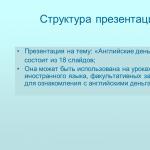To use presentation previews, create a Google account and log in to it: https://accounts.google.com
Slide captions:
We are creating a course for parents on children's information security
Purpose of the course: To provide methodological assistance to parents on information security issues for schoolchildren
The objectives of the project are to identify the level of competence of parents on information security issues; c - create an information space for parents where they can familiarize themselves with materials on children’s information security, as well as ask questions and receive competent answers to them; - introduce parents to the laws ensuring information security; - develop an algorithm for parents’ actions to ensure children’s information security; - develop scenarios for assessing qualities and skills related to safe online behavior (formative assessment); - to form a responsible attitude and awareness of the importance of parental participation in raising children’s safe behavior online; - organize the exchange of knowledge and experience, personally meaningful communication between training participants.
Project questions: Fundamental question: Is peace possible in the digital world? Problematic questions: Does the Internet bring more good or harm? “Network” woven - by whom? Can a family ensure information security for their children? How to prepare children for life in the information society? Can parents, using the Internet, further teach their children (self-education)? Study Questions: What dangers can you encounter on the Internet? How to detect danger? What is information security for children? What rules of internet etiquette should you follow? What self-education resources can parents recommend to their children? What is the classification of Internet addictions? How can you get rid of Internet addiction?
“We want the Internet to be your friend for many years! You will know the ten rules of these Boldly surf the Internet!”
Useful links on Internet safety for children Ensuring children's safety when using the Internet: http://www.oszone.net/6213/ Internet safety tips for children aged 13 to 17 years: http://www.microsoft.com /rus/protect/athome/children/kidtips13-17.mspx Parents' Guide to Children's Internet Safety: Ages and Developmental Stages http://www.microsoft.com/rus/protect/athome/children/parentsguide.mspx Your child and Internet: Review of programs for parental control: http://vash-inet-master.ru/safety/safety_fameli/160-vash-rebenok-i-internet.html
List of resources 1. http://yandex.ru/yandsearch?lr=213&text=%D0%BA%D0%B0%D1%80%D1%82%D0%B8%D0%BD%D0%BA%D0%B0+ %D0%B4%D0%B5%D1%82%D0%B8+%D1%80%D0%BE%D0%B4%D0%B8%D1%82%D0%B5%D0%BB%D0%B8+%D0 %B8+%D0%BA%D0%BE%D0%BC%D0%BF%D1%8C%D1%8E%D1%82%D0%B5%D1%80 2. http://nafisa.ucoz.ru/ index/bezopasnyj_internet/0-73 3. http://www.icounselling.org/2010-07-11-06-28-19/129--5-6-.html 4. http://www.youtube. com/
On the topic: methodological developments, presentations and notes
Organization of work with parents of younger teenagers on children’s information security
A reminder for parents, which is designed to protect children from online threats and make using the Internet as useful as possible....
Parents' meeting "Information security of children and adolescents"
Parent meeting. This development provides information for parents about the correct and safe use of the Internet by children. There is a presentation and videos on this topic....
























1 of 24
Presentation on the topic: Information security for children
Slide no. 1

Slide description:
Slide no. 2

Slide description:
Parent meeting on the topic “Children in the modern media world” A series of classes to improve parental competence in the field of media resources. A series of classes to improve computer literacy of parents. Organizing a page for parents on the school website. Individual conversations and consultations.
Slide no. 3

Slide description:
Slide no. 4

Slide description:
3. Explain to your child that when communicating in chats, using instant messaging programs (such as ICQ, Microsoft Messenger, etc.), using online games and other situations that require registration, you cannot use a real name, help your child choose a registration name that does not contain any personal information;
Slide no. 5

Slide description:
Slide no. 6

Slide description:
5. Explain to your child that in real life and on the Internet there is no difference between wrong and right actions; 6. Teach your children to respect others on the Internet. Make sure they understand that good manners apply the same online as they do in real life; 7. Tell them to never date friends from the Internet. After all, people may not turn out to be who they say they are;
Slide no. 7

Slide description:
8. Explain to children that not everything they can read or see on the Internet is true. Train them to ask about things they are unsure about; 9. Don't forget to control your children on the Internet using special software. This will help you filter out harmful content, find out which sites your child is actually visiting and what he is doing there.
Slide no. 8

Slide description:
How to teach children to distinguish truth from lies on the Internet? Children should be explained that they need to be critical of materials received from the Internet, because absolutely anyone can publish information on the Internet. Explain to your child that today almost anyone can create their own website and no one will control how truthful the information posted there is. Teach your child to check everything he sees on the Internet. Start when your child is still young. After all, today even preschoolers are already successfully using the Internet, which means they need to be taught as early as possible to separate truth from lies;
Slide no. 9

Slide description:
Don't forget to ask your child about what he sees on the Internet. For example, start by asking what a particular site is for. Make sure that your child can independently check information read on the Internet from other sources (other websites, newspapers or magazines). Teach your child to consult with you. Don't brush off their childhood problems. Encourage your children to use a variety of sources, such as libraries, or give them an encyclopedia on disk, such as the Encyclopedia of Cyril and Methodius or Microsoft Encarta. This will help teach your child to use third-party sources of information; Teach your child to use Internet search. Show how to use different search engines to perform searches;
Slide no. 10

Slide description:
Explain to your children what racism, fascism, ethnic and religious hatred are. Although some such material can be blocked using special software filters, you should not expect that you will be able to filter out all such sites.
Slide no. 11

Slide description:
Family Internet Agreement If your children want to access the Internet, you should work out an Internet use agreement with them. Please note that in it you must clearly describe the rights and responsibilities of each member of your family. Be sure to clearly formulate answers to the following questions: What sites can your children visit and what can they do there; How much time can children spend on the Internet? What to do if something bothers your children when visiting the Internet; How to protect personal data; How to monitor safety; How to behave politely; How to use chat rooms, news groups and instant messaging services.
Slide no. 12

Slide description:
When using an instant messaging service, remind your child of some simple safety rules: Never fill out fields related to personal information, because anyone can view them; Never talk to strangers on the Internet; Check your children's contact list regularly to make sure they know everyone they communicate with; Please carefully review requests to add new friends to your list. Remember that a person online may not be who they say they are; You should not use instant messaging to spread rumors or gossip. Parents should not rely on secret surveillance of instant messaging services used by children. It is much easier to use a friendly relationship with your children.
Slide no. 13

Slide description:
What can children aged 5-6 years do? Children of this age are characterized by a positive outlook on the world. They take pride in their reading and math skills and love to share their ideas. Even though children at this age are very capable in using games and using a mouse, they still depend heavily on you when searching for children's sites. How can we help them do this safely? At this age, it is advisable to use the Internet only in the presence of parents; Be sure to explain to your child that communicating on the Internet is not real life, but a kind of game. At the same time, try to direct his efforts to understanding the world; Add children's sites to the Favorites section. Create a folder there for the sites your children visit; Use special children's search engines, such as MSN Kids Search (http://search.msn.com/kids/default.aspx?FORM=YCHM); Use tools to block inappropriate content as an addition to standard Parental Controls; Teach your child never to give out information about himself and his family on the Internet; Encourage your child to report any Internet-related threats or concerns to you.
Slide no. 14

Slide description:
Ages 7 to 8 years It is absolutely natural for children of this age to want to find out what they can do without parental permission. As a result, while on the Internet, the child will try to visit certain sites, and possibly chat rooms, that he would not have received permission to visit from his parents. Therefore, at this age, the reports that Parental Control will provide you or what you can see in temporary Internet files (folders c:\Users\User\AppData\Local\Microsoft\Windows\Temporary Internet Files in the Windows operating system) will be especially useful Vista). As a result, your child won't feel like you're looking over their shoulder at the screen, but you'll still know what sites your child is visiting. It is worth understanding that children at this age have a strong sense of family, they are trusting and do not doubt authority. Children of this age love to play online games and surf the Internet. It is possible that they use email and may access sites and chat rooms that are not recommended by their parents. Regarding the use of e-mail, I would like to note that at this age it is recommended not to allow children to have their own e-mail account, but to use the family one so that parents can control the correspondence. Software such as Kaspersky Internet Security version 7.0 with built-in parental controls can help you prevent your child from using external free boxes.
Slide no. 15

Slide description:
Create a list of house rules for visiting the Internet with the participation of children and demand their implementation; Require your child to comply with time limits for being at the computer; Show your child that you are watching him not because you want to, but because you are concerned about his safety and are always ready to help him; Teach your children that they should only visit sites that you allow, i.e. create a so-called Internet “white” list for them using Parental Control tools. We'll talk about how to do this later; A computer with an Internet connection must be located in the common room under the supervision of parents; Use special children's search engines, such as MSN Kids Search (http://search.msn.com/kids/default.aspx?FORM=YCHM); Use tools to block inappropriate content as an addition to standard Parental Controls; Create a family email account to prevent children from having their own addresses; Block access to sites with free mailboxes using appropriate software;
Slide no. 16

Slide description:
Encourage your children to consult with you before posting any information through email, chat, registration forms and profiles; Teach your children not to download files, programs or music without your consent; Use email filters to block messages from specific people or containing certain words or phrases. More information about such filters http://www.microsoft.com/rus/athome/security/email/fightspam.mspx Do not allow children to use instant messaging services; Add only sites with a good reputation to the “white” list of sites allowed for visiting; Remember to talk to your children about their online friends as if you were talking about friends in real life; Do not make sexual issues a “taboo”, as children can easily stumble upon pornography or “adult” sites on the Internet; Encourage your child to report any Internet-related threats or concerns to you. Remain calm and remind children that they are safe if they tell you about their threats or concerns. Praise them and encourage them to come again in similar cases.
Slide description:
Rule 1. Be attentive to the actions of your children on the World Wide Web: Do not send your children “freely swimming” on the Internet. Try to actively participate in your child’s communication with the Internet, especially at the development stage. Talk with your child about what new things he learns about himself using the Internet and how to prevent threats in time.
Slide no. 20

Slide description:
Rule 2. Inform your child about the opportunities and dangers that the Internet brings: Explain to your child that on the Internet, as in life, there are both good and bad people. Explain that if a child encounters negativity or violence from another Internet user, he needs to tell loved ones about it. Teach your child to look for the information he needs and check it, including with your help. Teach your child to be careful about downloading paid information and receiving paid services from the Internet, especially by sending SMS, in order to avoid losing money. Create a list of useful, interesting, safe resources that your child can use, and advise them to use them.
Slide no. 21

Slide description:
Rule 3. Choose a convenient form of monitoring your child’s online presence: Install the necessary software on your computer - a parental control solution. If your child is an elementary school student and is often left alone at home, limit your child's time on the Internet. If the computer is shared by everyone in the family, install it in a location accessible to everyone in the family, not in the child's room. Create separate accounts on your computer for adults and children. This will help not only protect your child, but also protect your personal data. Regularly monitor the resources your child visits. Simple computer settings will allow you to be aware of what information your child has viewed.
Slide no. 24
 Slide description:
Slide description:
Slide 2
What is Information?
Information is information about the world around us. What types of information do you know?
Slide 3
! – I understood the information. - I didn’t quite understand the information. ? – I didn’t understand the information
Slide 4
Read it.
The state ensuring the information security of children, protecting their physical and mental health, human dignity in all electronic media and media services is a requirement of international law and the legislation of the Russian Federation.
Slide 5
Media - mass media. These are means of conveying information (verbal, visual, audio). For example: Internet, radio, television, telephone, newspapers, magazines, etc.
Print media:______________ Electronic media:______________
Slide 6
Electronic media is television, Internet, radio. Media services are scanning, photocopying, laminating, faxing. printing photos from flash cards, digital cameras, mobile phones, and other media.
Slide 7
Safe Internet!
Slide 8
Internet criminals Malware Internet fraud and credit card data theft Gambling Online piracy Internet diaries Internet hooliganism False information Objectionable materials
Slide 9
Criminals on the Internet ACTIONS THAT CRIMINAL TAKE ON THE INTERNET. Criminals primarily establish contact with children through chat rooms, instant messaging, email, or forums. To solve their problems, many teenagers seek support. Attackers often live there themselves; they try to attract the teenager with their attention, caring, kindness and even gifts, often spending significant time, money and energy on these efforts. They are usually well informed about new musical releases and modern hobbies of children. They listen to teenagers' problems and sympathize with them. But gradually, attackers introduce a hint of sexuality into their conversations or show materials with overtly erotic content, trying to weaken the moral prohibitions that hold young people back. Some offenders may act faster than others and immediately initiate sexual conversations. Offenders may also evaluate the possibility of meeting children in real life.
Slide 10
Malware Malware includes viruses, worms, and Trojan horses, which are computer programs that can harm your computer and the data stored on it. They can also slow down the speed of data exchange with the Internet and even use your computer to distribute copies of themselves to the computers of your friends, relatives, colleagues and throughout the rest of the global Network.
Slide 11
Internet fraud and theft of credit card data WHAT DOES FRAUD CONSISTE? Among Internet scams, a common technique used by hackers is “phishing,” which involves including a link in a fake e-mail that points to a popular site, but in reality it takes the user to a fraudulent site that looks exactly like the official one. Having convinced the user that he is on an official site, hackers try to persuade him to enter passwords, credit card numbers and other secret information, which can and will then be used to the detriment of the user.
Slide 12
Gambling The difference between gaming sites and gambling sites is that gaming sites typically contain board games, word games, arcade games, and point-based puzzles. No money is spent here: neither real money nor game money. Unlike gaming sites, gambling sites may allow people to win or lose play money. Money gaming sites usually contain games that involve winning or losing real money.
Slide 13
Online Piracy Online piracy is the illegal copying and distribution (for both business and personal purposes) of copyrighted material - such as music, films, games or software - without the permission of the copyright owner.
Slide 14
Online Diaries Never post any personal information, including your last name, contact information, home address, telephone numbers, school name, email address, last names of friends or relatives, your instant messaging names, age or date of birth. Never include provocative photographs of yourself or anyone else in a magazine, and always check that the images or even the background of the photographs do not reveal any personal information.
Ensuring the state's information security of children, protecting the physical, mental and moral development of minors, as well as human dignity in all audiovisual media services and electronic media is a requirement of international law.

Adopted on December 29, 2010, Federal Law of the Russian Federation 436-FZ “On the protection of children from information harmful to their health and development” establishes the rules for media safety of children when circulating media products, printed, audiovisual products on any type of media, programs in Russia for computers and databases, as well as information placed in information and telecommunication networks and mobile radiotelephone networks. The law defines children's information security as a state of security in which there is no risk associated with information (including information distributed on the Internet) causing harm to their health, physical, mental, spiritual and moral development.

Federal Law of the Russian Federation dated July 21, 2011 252-FZ "On amendments to certain legislative acts of the Russian Federation in connection with the adoption of the Federal Law "On the protection of children from information harmful to their health and development", aimed at protecting children from destructive , traumatic information influence on their psyche, an excess of cruelty and violence in publicly available media sources, from information that can develop vicious inclinations in a child, form in a child a distorted picture of the world and incorrect life attitudes.The law establishes a procedure for stopping the distribution of mass media products carried out with violation of statutory requirements.

To help your children, you need to know this: Be aware of what your children are doing online. Ask them to teach you how to use various applications that you have not used before. Help your children understand that they should not provide information about themselves to anyone on the Internet - mobile phone number, home address, school name/number, or show photos of themselves and their family. After all, anyone on the Internet can see it. If your child receives spam (unsolicited email), remind him not to believe what is written in the emails and to never respond to them. Explain to your children that they should not open files sent from people you do not know. These files may contain viruses or photos/videos with “aggressive” content.

Make sure your children check with you before ordering, buying or selling anything online; Explain to children that they should not download software, music, or files from the Internet without your permission. By sharing files and downloading text, images and other materials from the Internet, they may violate copyright laws. Find out from your children what chat rooms and message boards they visit and who they communicate with. Encourage communication in monitored chat rooms and insist that children only communicate in shared chat room windows.

Help your child understand that some people on the Internet may not be telling the truth and may not be who they say they are. Children should never meet online friends in real life on their own without an adult. Communicate with your children regularly. It's never too late to tell your child how to act and react correctly to the actions of other people on the Internet. Teach your children how to react if someone has offended them or they have received/came across aggressive content on the Internet, and also tell them where they can turn in such a case. Make sure that filtering tools are installed and configured correctly on computers.


The key functions of the Parental Control module are: Blocking sites by category (pornography/erotica, drugs, violence, obscene language, weapons, gambling, chats, Internet mail, social networks, extremism/terrorism); Protection against cybercrime targeting children; Limiting children's access to the Internet and certain applications (for example, games) according to a schedule; Enabling the search function taking into account age restrictions; Setting up user accounts; Blocking access to portable information storage devices, network devices, disk drives, as well as individual files and directories, making it impossible to delete or steal confidential information.

If you are concerned about the safety of a child when working on the Internet or using mobile communications, If a child is in danger or has become a victim of online stalkers and scammers, contact the “Children Online” helpline. Experts will help solve the problem and also advise on the safe use of mobile phones by children communications and Internet Call (calls within Russia are free, calls are accepted on weekdays from 9-00 to Moscow time) Or send your letter to:



















